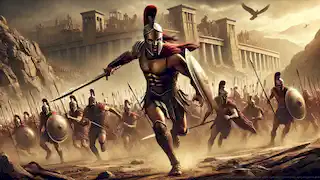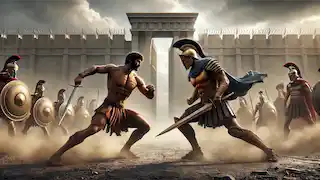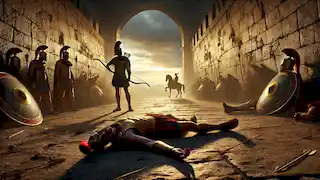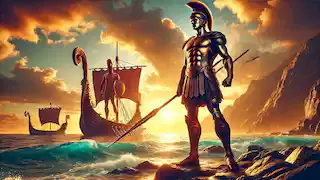In the heart of Greece, where the ancient gods once walked the earth and legends shaped the destiny of mankind, there lies a story of unparalleled bravery, pride, and tragedy. This is the tale of Achilles, the greatest warrior the world had ever known. He was a man gifted with strength and unmatched prowess on the battlefield, yet fate's cruel hand had destined him for a tragic end—one that would forever be linked to his famous "Achilles' Heel."
Achilles' story is not just one of glory and power but also a deep exploration of the human condition, the fragility of life, and the consequences of defying both the gods and mortality. This epic begins with his birth and carries us through the timeless struggle between heroism and vulnerability. The story of Achilles begins not in a grand palace, but in the ethereal realms of the gods. His mother, Thetis, a sea nymph of great beauty and power, was destined to marry a mortal man, Peleus, king of the Myrmidons. The marriage was ordained by the gods themselves, though Thetis had long resisted the idea of binding herself to a mere mortal. Nevertheless, their union was blessed, and soon Thetis gave birth to a child unlike any other—a boy who would grow to become the greatest warrior of all time. From the moment of his birth, Thetis knew Achilles was special. She loved him with the fierce protectiveness only a mother could have. Determined to keep him safe from the mortal dangers of the world, she sought out ways to make him invincible. It was said that Thetis, in her desperation, dipped Achilles into the River Styx, a mythical river believed to grant invulnerability to those who touched its waters. However, in her haste, Thetis held Achilles by his heel, the one part of his body that remained untouched by the river's magic. From that moment on, Achilles was invulnerable everywhere but his heel—a fatal flaw that would later bring him to his doom. Achilles grew strong and fearless, trained by the centaur Chiron, a wise and noble creature skilled in the arts of war and healing. Under Chiron's tutelage, Achilles learned to fight, to strategize, and to master the sword and spear. His prowess was unrivaled, and his reputation as a warrior began to spread across the Greek world. As he matured, Achilles developed not only into a formidable fighter but also into a man of deep pride and unyielding will. His mother, still protective, sought to keep him from the horrors of war, but Achilles’ destiny was intertwined with battle. The winds of war were rising in the lands of Troy, and the Greeks, led by King Agamemnon, called upon their bravest warriors to join them. Despite his mother's pleas, Achilles knew that his fate lay on the battlefield. His thirst for glory and honor was insatiable, and he longed to carve his name into the annals of history. The Greek army could not sail to Troy without him, for it was foretold that without Achilles, they would never conquer the great city. Achilles agreed to join the expedition, but he was not just another warrior in the ranks. He commanded a force of his own—the mighty Myrmidons, an elite group of soldiers feared for their discipline and ferocity in combat. Together, they sailed across the Aegean Sea to lay siege to Troy, a city whose walls were said to be impenetrable. The siege of Troy dragged on for years, and Achilles quickly proved his worth. He led his men into battle with unrivaled courage, striking down Trojan warriors and becoming a symbol of fear for his enemies. His rage on the battlefield was legendary, and even the gods watched his feats with a mixture of awe and trepidation. Yet, as the war continued, Achilles’ relationship with King Agamemnon soured. The two clashed over pride and honor, leading to a bitter conflict that nearly cost the Greeks the war. In a fit of rage, Achilles withdrew from battle, refusing to fight for a king he no longer respected. His absence was keenly felt, and the Trojans, led by the valiant Hector, began to push the Greeks back toward their ships. It was in this moment of crisis that Achilles’ close companion, Patroclus, begged him to return to the fight. Unable to convince Achilles himself to rejoin the battle, Patroclus donned Achilles’ armor and led the Myrmidons into the fray in his place. The sight of "Achilles" on the battlefield reignited the Greek spirits, and they charged into battle with renewed vigor. But Patroclus was not Achilles, and despite his bravery, he fell in battle at the hands of Hector. When news of Patroclus’ death reached Achilles, it shattered him. Grief, guilt, and fury consumed him, and he vowed to avenge his fallen friend. Blinded by rage, Achilles returned to the battlefield with a single goal—to kill Hector, the man who had slain Patroclus. The two warriors met before the walls of Troy, where Achilles, driven by an unquenchable thirst for revenge, faced off against Hector in a duel that would be remembered for centuries. The gods watched in silence as Achilles and Hector circled one another, their weapons gleaming in the sun. Hector, though a skilled warrior, was no match for Achilles’ fury. With brutal efficiency, Achilles struck Hector down, and in a final act of desecration, he dragged Hector’s body behind his chariot, parading it around the city of Troy. The death of Hector was a turning point in the war, but it also marked the beginning of Achilles’ downfall. Despite his victory, Achilles was consumed by his own anger and grief, and the gods, displeased with his defiance and lack of humility, began to conspire against him. The Greeks, with Achilles back in their ranks, continued to press their assault on Troy. But Achilles’ fate had already been sealed. In the final days of the war, Paris, a Trojan prince and the instigator of the conflict, took up a bow and arrow. Guided by the god Apollo, Paris aimed for Achilles’ one vulnerable spot—his heel. The arrow flew through the air and struck Achilles in the heel, the only part of his body not protected by the River Styx. The great warrior, invincible in every other way, fell to the ground, his life ebbing away. His death was a devastating blow to the Greeks, but it also signaled the beginning of the end for Troy. Despite his death, Achilles' legacy endured. His name became synonymous with both greatness and vulnerability, a reminder that even the mightiest heroes are not invincible. Achilles was mourned by his fellow warriors, and his body was given a hero’s burial. Songs were sung of his bravery, and his deeds were passed down through the generations. The story of Achilles and his fateful heel would become one of the most enduring tales of Greek mythology, a cautionary story of pride, glory, and the inevitable downfall of those who defy the gods. The Greeks eventually won the war, thanks to the cunning of Odysseus and the infamous Trojan Horse, but the victory came at a great cost. Achilles, the greatest of their warriors, had perished, leaving behind a legacy that would echo through the ages. The tale of Achilles is not just a story of war and heroism; it is a story of the human condition. Achilles was a man blessed with incredible gifts, yet he was also deeply flawed. His pride, his rage, and his insatiable desire for glory led him down a path that ultimately ended in his destruction. Yet, even in death, Achilles achieved what he had always desired—immortality. His name, his deeds, and his story have endured for millennia, a testament to the power of myth and the enduring legacy of one of Greece’s greatest heroes.The Birth of a Hero

A Warrior's Destiny
The Wrath of Achilles

Hector and the Gates of Troy
The Death of Achilles

Achilles' Legacy

Conclusion



















